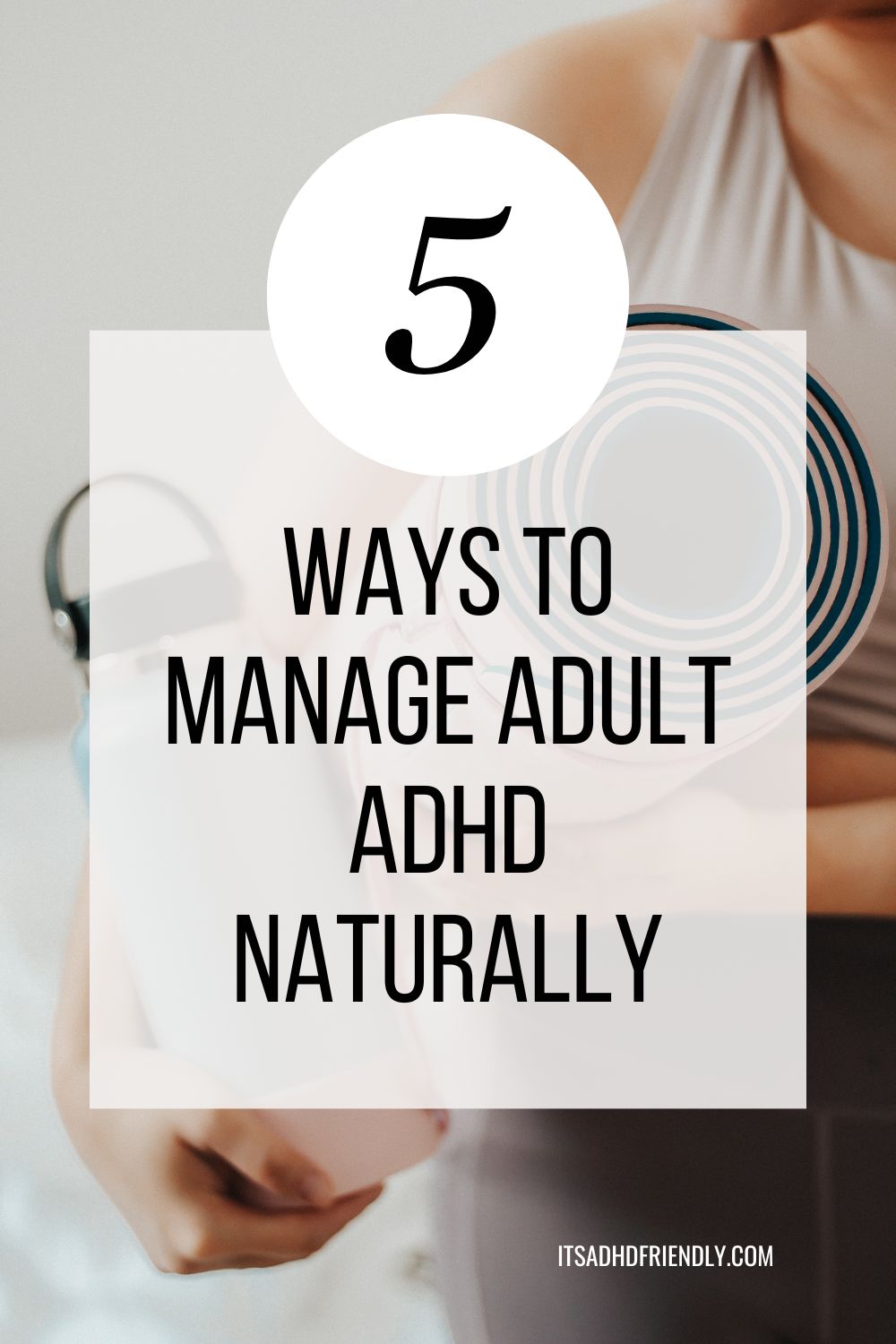Understanding And Managing ADHD Symptoms Naturally

Table of Contents
Many people with ADHD seek natural ways to manage their symptoms. Medication can be incredibly helpful, but a holistic approach often yields the best results. This article explores effective, natural strategies to help you better understand and cope with ADHD challenges, improving your focus, concentration, and overall quality of life. We’ll delve into diet, exercise, mindfulness techniques, and helpful supplements, offering a comprehensive, natural approach to ADHD symptom management.
Dietary Strategies for ADHD Symptom Management
Managing ADHD naturally often starts with what you eat. The link between diet and brain function is undeniable, and for those with ADHD, making mindful food choices can significantly impact symptom severity.
The Importance of a Balanced Diet
Blood sugar fluctuations and nutrient deficiencies can exacerbate ADHD symptoms like inattention, hyperactivity, and impulsivity. A stable blood sugar level is crucial for consistent energy and focus.
- Focus on whole foods: Prioritize fruits, vegetables, lean proteins, and whole grains. These provide sustained energy and essential nutrients.
- Limit processed foods and sugar: Processed foods and sugary drinks lead to energy crashes and mood swings, worsening ADHD symptoms.
- Importance of regular meal times: Consistent mealtimes help regulate blood sugar and prevent energy dips that can trigger inattention and hyperactivity.
- Avoid artificial colors and preservatives: Some studies suggest a link between artificial additives and hyperactivity in children with ADHD.
Specific Nutrients for ADHD Support
Certain nutrients play a vital role in brain health and may help mitigate ADHD symptoms.
- Omega-3 fatty acids: These essential fats are crucial for brain development and function. Good sources include fatty fish (salmon, tuna), flaxseeds, and chia seeds. Omega-3 supplements can be considered, but always consult a healthcare professional before starting any supplement regimen.
- Magnesium: This mineral is involved in numerous brain functions, including neurotransmitter production. Good sources include leafy greens, nuts, and seeds.
- Iron: Iron deficiency can affect cognitive function and energy levels. Red meat, beans, and spinach are good sources of iron.
- Zinc: Zinc plays a role in brain development and neurotransmission. Sources include oysters, pumpkin seeds, and lentils. Again, supplement use should be discussed with your doctor. Monitoring for improvements in focus, concentration, and mood can help gauge the effectiveness of dietary changes.
The Power of Exercise for ADHD
Physical activity is a powerful tool in managing ADHD symptoms naturally. Exercise isn't just about physical health; it significantly impacts brain function and mood regulation.
Exercise and Brain Function
Exercise improves focus, reduces hyperactivity, and boosts mood by increasing blood flow to the brain and releasing endorphins, natural mood boosters.
- Types of exercise beneficial for ADHD: Yoga, running, swimming, team sports, and even brisk walking can be beneficial. Find activities you enjoy to promote adherence.
- Frequency and intensity recommendations: Aim for at least 30 minutes of moderate-intensity exercise most days of the week. Start slowly and gradually increase intensity and duration.
- The release of endorphins and their impact: Endorphins have mood-boosting effects, helping to alleviate symptoms of anxiety and irritability often associated with ADHD.
Finding the Right Exercise Routine
Creating a sustainable exercise plan tailored to your individual needs and preferences is key to long-term success.
- Starting slowly: Don't try to do too much too soon. Start with short sessions and gradually increase the duration and intensity.
- Incorporating enjoyable activities: Choose activities you find fun and engaging. This makes it more likely that you'll stick with your exercise routine.
- Finding an exercise buddy for accountability: Exercising with a friend or family member can provide support and motivation.
Mindfulness and ADHD: Calming the Mind
Mindfulness practices can be incredibly effective in managing ADHD symptoms by improving focus, reducing impulsivity, and enhancing emotional regulation.
Mindfulness Techniques for Focus
Mindfulness meditation, deep breathing exercises, and yoga can significantly improve attention and reduce impulsivity.
- Guided meditation apps: Numerous apps offer guided meditations specifically designed for ADHD.
- Short mindfulness exercises throughout the day: Even a few minutes of focused breathing can help to calm the mind and improve focus.
- Benefits of regular practice: Consistent mindfulness practice can lead to significant improvements in attention, emotional regulation, and overall well-being.
Managing Emotional Regulation with Mindfulness
Mindfulness helps manage emotional dysregulation, a common challenge for individuals with ADHD.
- Observing emotions without judgment: Mindfulness teaches you to observe your emotions without getting carried away by them.
- Developing coping mechanisms: Mindfulness practices provide tools to cope with overwhelming emotions in a healthy way.
- Practicing self-compassion: Self-compassion is crucial for managing the challenges associated with ADHD.
Supplements to Consider for ADHD Symptom Relief (Always Consult Your Doctor)
While diet, exercise, and mindfulness are foundational, some supplements may offer additional support. It is crucial to consult your doctor before starting any new supplement regimen. They can assess your individual needs and potential interactions with any medications you may be taking.
Omega-3 Fatty Acids
Omega-3s have shown promise in improving ADHD symptoms in some studies. However, individual responses vary.
- Dosage recommendations: Dosage varies, so consult your doctor for personalized recommendations.
- Food sources: Fatty fish, flaxseeds, chia seeds.
- Potential interactions with other medications: Omega-3s can interact with certain blood thinners; your doctor will need to consider this.
Magnesium and Other Essential Nutrients
Other nutrients, like magnesium, zinc, and B vitamins, may also play a supportive role. Again, always consult your doctor before taking any supplements.
- Importance of individual needs assessment: Your doctor can determine if you have any deficiencies and recommend appropriate supplementation.
- Potential interactions: Supplements can interact with medications, so your doctor's guidance is essential.
- The need for professional guidance: Don't self-diagnose or self-treat. A healthcare professional can provide personalized advice and monitoring.
Conclusion
Managing ADHD symptoms naturally involves a holistic approach combining dietary changes, regular exercise, mindfulness practices, and potentially, supplements (always under a doctor's guidance). A balanced diet rich in whole foods and essential nutrients is crucial for stable energy levels and brain function. Regular exercise improves focus, reduces hyperactivity, and boosts mood. Mindfulness techniques help calm the mind and enhance emotional regulation. Supplements can offer additional support, but only under professional medical supervision.
Start managing your ADHD symptoms naturally today! Explore the strategies outlined in this article and take small steps towards a healthier, more focused you. Remember to consult with your doctor or a qualified healthcare professional before making significant changes to your diet or supplement routine. Learn more about natural approaches to ADHD management [link to relevant resource or further reading].

Featured Posts
-
 Kentucky Governor Issues State Of Emergency Due To Imminent Heavy Rain And Flooding
Apr 29, 2025
Kentucky Governor Issues State Of Emergency Due To Imminent Heavy Rain And Flooding
Apr 29, 2025 -
 Ekspertt Po Grip Prof Iva Khristova Otkhvrlya Opaseniyata Za Nova Vlna
Apr 29, 2025
Ekspertt Po Grip Prof Iva Khristova Otkhvrlya Opaseniyata Za Nova Vlna
Apr 29, 2025 -
 Capital Summertime Ball 2025 How To Buy Tickets Successfully
Apr 29, 2025
Capital Summertime Ball 2025 How To Buy Tickets Successfully
Apr 29, 2025 -
 A New Setting For White Lotus Exploring Potential Locations
Apr 29, 2025
A New Setting For White Lotus Exploring Potential Locations
Apr 29, 2025 -
 Concern Grows For Missing British Paralympian Sam Ruddock In Las Vegas
Apr 29, 2025
Concern Grows For Missing British Paralympian Sam Ruddock In Las Vegas
Apr 29, 2025
